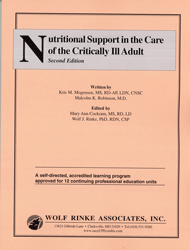|
|
|
|||||||||||||||||||
|
List of All Activities
Share an Activity: Order Form |
||||||||||||||||||||
Valuable information and tools to assist you in providing appropriate nutritional support for critically ill patients that will help you:
Share with a friend and Save! Click here for important information about
sharing.
Nutritional Support in the Care of the Critically Ill Adult, Second Edition © 2024 Wolf Rinke Associates. All rights reserved for this self-directed accredited learning activity. Reproduction in whole or part without written permission, except for brief excerpts, is prohibited. GOAL OBJECTIVES
Kris M. Mogensen is a registered dietitian with a Master of Science degree in human nutrition from Framingham State University. She has 19 years of experience in the nutrition field and managing critically ill patients. She currently is a Team Leader Dietitian at Brigham and Women’s Hospital, Boston, MA, and is an Instructor in Nutrition at Boston University College of Health and Rehabilitation Sciences: Sargent College. She has co-authored numerous articles in professional journals, textbook chapters, and professional manuals. She lectures nationally and internationally on nutrition support and medical nutrition therapy. She serves as a reviewer for the journal Critical Care Nurse. Malcolm K. Robinson is an Assistant Professor of Surgery at Harvard Medical School, a bariatric surgeon and attending physician with the Metabolic Support Service Brigham and Women's Hospital, Boston, Massachusetts. He received a Doctor of Medicine from Harvard Medical School, trained in Surgery at Brigham and Women's Hospital, and did a nutrition research fellowship in the laboratory for surgical metabolism at Brigham and Women’s Hospital. He has over twenty years of experience in managing nutritionally complex patients including those in the ICU, those with short bowel disease, and obese individuals. His research interests include short bowel syndrome, nutrition in multiple organ failure, and obesity. He authored and co-authored several research abstracts, papers, and textbook chapters in the area of metabolic and nutritional support. If you prefer to order by phone, mail or fax click below Order Formor click here to contact us with other questions. For information about our other products and services return to the sidebar at the top of the page. |
||||||||||||||||||||

